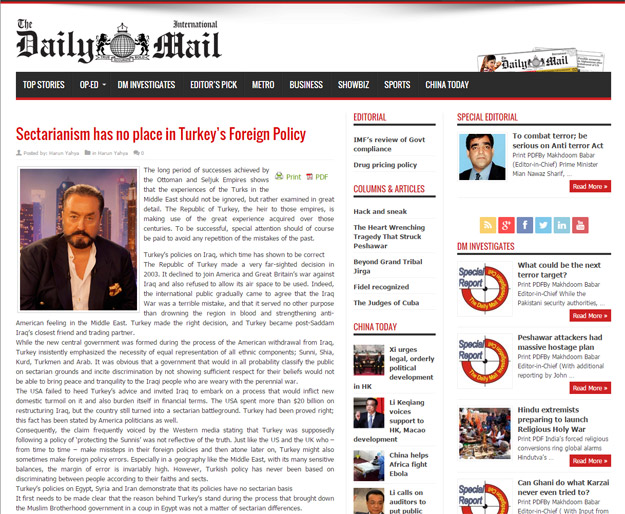
The long period of successes achieved by the Ottoman and Seljuk Empires shows that the experiences of the Turks in the Middle East should not be ignored, but rather examined in great detail. The Republic of Turkey, the heir to those empires, is making use of the great experience acquired over those centuries. To be successful, special attention should of course be paid to avoid any repetition of the mistakes of the past.
Turkey’s policies on Iraq, which time has shown to be correct
The Republic of Turkey made a very far-sighted decision in 2003. It declined to join America and Great Britain’s war against Iraq and also refused to allow its air space to be used. Indeed, the international public gradually came to agree that the Iraq War was a terrible mistake, and that it served no other purpose than drowning the region in blood and strengthening anti-American feeling in the Middle East. Turkey made the right decision, and Turkey became post-Saddam Iraq’s closest friend and trading partner.
While the new central government was formed during the process of the American withdrawal from Iraq, Turkey insistently emphasized the necessity of equal representation of all ethnic components; Sunni, Shia, Kurd, Turkmen and Arab. It was obvious that a government that would in all probability classify the public on sectarian grounds and incite discrimination by not showing sufficient respect for their beliefs would not be able to bring peace and tranquility to the Iraqi people who are weary with the perennial war.
The USA failed to heed Turkey’s advice and invited Iraq to embark on a process that would inflict new domestic turmoil on it and also burden itself in financial terms. The USA spent more than $20 billion on restructuring Iraq, but the country still turned into a sectarian battleground. Turkey had been proved right; this fact has been stated by America politicians as well.
Consequently, the claim frequently voiced by the Western media stating that Turkey was supposedly following a policy of ‘protecting the Sunnis’ was not reflective of the truth. Just like the US and the UK who – from time to time – make missteps in their foreign policies and then atone later on, Turkey might also sometimes make foreign policy errors. Especially in a geography like the Middle East, with its many sensitive balances, the margin of error is invariably high. However, Turkish policy has never been based on discriminating between people according to their faiths and sects.
Turkey’s policies on Egypt, Syria and Iran demonstrate that its policies have no sectarian basis
It first needs to be made clear that the reason behind Turkey’s stand during the process that brought down the Muslim Brotherhood government in a coup in Egypt was not a matter of sectarian differences.
The Muslim Brotherhood is a Sunni organization, but Sisi, who seized power, is not a Shiite but a Sunni. The attitude of the Turkish government stems not from a sectarian difference, but from the removal of democracy by a coup and the killing of approximately 1,000 protesters on the same day. The violence associated with the coup takes its place in history as one of the bloodiest events in the history of modern Egypt.
Turkey’s strong opposition to the Assad regime regarding the Syrian civil war stems not from the fact that the regime is not a Sunni one, but from the shelling that has caused the deaths of hundreds of thousands of innocent civilians. Indeed, in the period immediately before the Syrian Civil War began, Prime Minister Recep Tayyip Erdoğan enjoyed very close relations with Bashar Assad. Indeed, the USA wanted Turkey to act as an intermediary in improving relations between Syria and Israel. Bashar Assad was not a Sunni then, either.
When the USA recently accused Turkey of not fully complying with the sanctions imposed on Iran in terms of the gold trade, it raised the fact that Turkey was the only country to open its borders with Iran and to impose no visa regime. Despite their differences of opinion over the civil war in Syria, Shiite Iran is Turkey’s friend. Indeed, the initiative to improve relations between Gulf countries and Iran totally disprove the idea that ‘Turkey thinks along sectarian lines.’
Turkey is a unifier and rejects divisions
Improper treatment towards Alawite citizens that has been observed in the recent history of Turkey or some acts of violence that occurred from time to time do not reflect the general approach of the Turkish state or the Turkish people. In Turkey, whose democratic development has frequently been undermined with various and sundry coups, much injustice and suffering has taken place because of the structure of the deep state. However these last 12 years have been a period in which these injuries have been relieved. The fact that 837 of the 931 Shiite assembly houses in Turkey were opened in the last 12 years is just one proof of this.
Home to peoples of many nations and faiths, Turkey is the country that best embodies a tolerant Islam that respects all beliefs. Reforms are taking place at full speed to increase the quality of life for all believers. To sum it up, the sectarian divisions that have grown more intense with the appearance of ISIL – and that prevail across the world now – do not affect Turkey’s foreign policy choices in any way.
Turkey always approaches problems in the world from a moral perspective, rather than one based on self-interest. By Allah’s leave, Turkey will also be instrumental in the Islamic world abandoning the spirit of division that currently afflicts it.
Adnan Oktar's piece on Daily Mail:
http://dailymailnews.com/2014/12/26/sectarianism-has-no-place-in-turkeys-foreign-policy/


